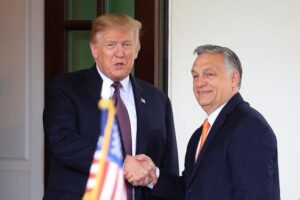Hungarian Prime Minister Viktor Orban has stirred controversy on Sunday with his assertion regarding the potential stance of former US President Donald Trump on providing financial support to Ukraine in its conflict against Russia. Orban, following a meeting with Trump in Florida, asserted that Trump would withhold funding for Ukraine’s resistance against Russia’s invasion if he were to be re-elected as US president.
This bold claim by Orban sheds light on the complex geopolitical dynamics surrounding the ongoing conflict in Ukraine and the role of key international players in shaping its trajectory.
Trump’s Pledge and Orban’s Endorsement
 Orban’s assertion comes in the wake of Trump’s pledge to swiftly end the conflict in Ukraine if he were to return to office.
Orban’s assertion comes in the wake of Trump’s pledge to swiftly end the conflict in Ukraine if he were to return to office.
Trump’s promise, however, lacks specific details on how this would be achieved, leaving room for interpretation and speculation.
Orban, a staunch supporter of Trump’s candidacy in the 2024 presidential race, openly endorsed Trump’s leadership qualities and praised his purported plans to resolve the Ukraine-Russia war.
This endorsement underscores the close alignment of Orban’s political agenda with that of Trump’s administration and highlights the potential implications for US foreign policy under a second Trump presidency.
Ukraine’s Dependency on International Support
 Orban’s remarks also highlight the critical dependency of Ukraine on financial and military assistance from the United States and European allies in its ongoing struggle against Russian aggression.
Orban’s remarks also highlight the critical dependency of Ukraine on financial and military assistance from the United States and European allies in its ongoing struggle against Russian aggression.
The assertion underscores the pivotal role of international support in sustaining Ukraine’s resistance efforts and underscores the geopolitical significance of the conflict in Eastern Europe.
Ukraine’s ability to withstand Russian aggression hinges on the continued support of its allies, making Orban’s claim a matter of significant concern for policymakers and analysts alike.
The debate surrounding the allocation of foreign aid to Ukraine reflects broader tensions within US politics and raises questions about the future direction of US foreign policy towards the region.
Implications for Geopolitical Dynamics and International Relations
Orban’s assertion regarding Trump’s stance on funding Ukraine’s fight against Russia carries significant implications for geopolitical dynamics and international relations. The possibility of a reduction in US military and financial aid to Ukraine under a second Trump presidency could reshape the balance of power in the region and impact broader security arrangements, including NATO’s role in deterring Russian aggression.
Moreover, Orban’s claim underscores the challenges facing Ukraine in navigating its relations with key international stakeholders and highlights the need for diplomatic efforts to de-escalate tensions and promote a peaceful resolution to the conflict.
The assertion also raises broader questions about the future of US foreign policy under a potential Trump administration, particularly in relation to its approach towards Russia and its allies in Eastern Europe.
Orban’s assertion regarding Trump’s stance on funding Ukraine’s fight against Russia underscores the complexities and uncertainties inherent in international relations. The geopolitical landscape is constantly evolving, shaped by the actions and statements of key actors on the global stage.
As Ukraine continues to grapple with the challenges posed by Russian aggression, the role of international support becomes increasingly crucial in determining the outcome of the conflict.
However, the shifting political dynamics, as highlighted by Orban’s claim, add another layer of complexity to the situation, raising questions about the future direction of US foreign policy and its implications for regional security and stability.
 In navigating these uncertainties, it becomes imperative for policymakers to engage in strategic diplomacy and multilateral cooperation.
In navigating these uncertainties, it becomes imperative for policymakers to engage in strategic diplomacy and multilateral cooperation.
Efforts to resolve the conflict in Ukraine must prioritize dialogue, negotiation, and the pursuit of peaceful solutions.
The international community, including the United States, Europe, and other stakeholders, must work collaboratively to support Ukraine’s sovereignty and territorial integrity, uphold international law, and deter further aggression from Russia.
Moreover, the implications of Orban’s assertion extend beyond the immediate context of the Ukraine-Russia conflict. They underscore broader questions about the future of US foreign policy, the role of international alliances such as NATO, and the dynamics of great power competition in the 21st century.
As the world grapples with complex geopolitical challenges, including rising authoritarianism, global power shifts, and technological disruptions, the need for principled leadership, strategic foresight, and effective cooperation becomes more pronounced than ever.
Ultimately, the resolution of conflicts like the one in Ukraine requires a concerted effort from the international community to address underlying grievances, promote inclusive dialogue, and build sustainable peace.
It is through collaboration, mutual respect, and a commitment to shared values that we can navigate the uncertainties of the contemporary global landscape and work towards a more peaceful, stable, and prosperous world for all.
ALSO READ: Portugal’s election sees far-right party’s potential pivotal role











Comments 2